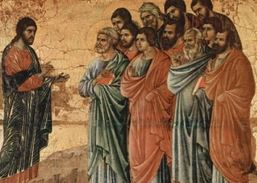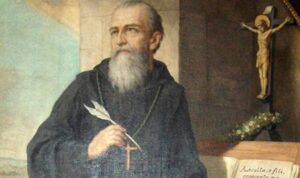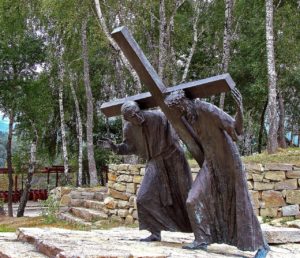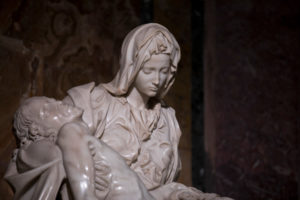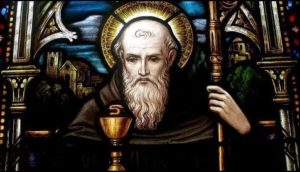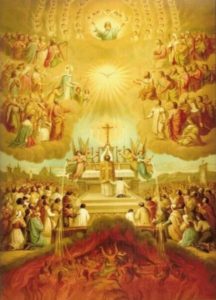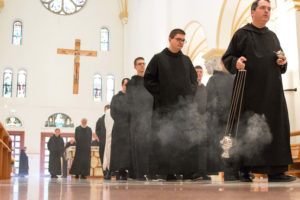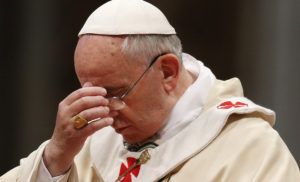Br. Daniel Sokol, OSB
Brother Daniel published this reflection for the Benedictine Oblates.
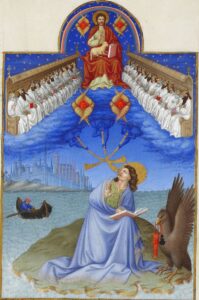
Well, the annual awesome Easter Season is upon us, and hopefully we are aiming towards getting more and more ready and willing to do God’s holy will. We are so blessed to have a treasure trove of so many liturgical wonderful feasts and holy saints to bless us on our journey and guide us through the daily pitfalls of this earthly life! If only we would consistently and prayerfully ask for their help, and then do whatever it is they suggest, we would, through perseverance, become so much closer to God and our end goal of reaching our heavenly homeland.
Our patron saints and Guardian Angels who are our subtle but “holy helpers” can keep us on track while we work our way towards heaven. They are happy to help us if we would only have recourse to them for their supernatural assistance. However, following their advice requires clarity of thought and single-minded perseverance! This is not an easy process; it takes lots of practice. We must become tuned in to our purpose with “the ear of our heart” (Rule of St. Benedict, Prol 1). There are numerous hurdles and “roadblocks.” The evil one constantly puts pitfalls on our paths, and flashes of distraction, thus obscuring our road to peace. We all too often make up weak excuses for our own worldly free will, and this obscures our otherwise clear-thinking process.
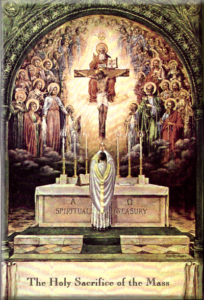 Season after season we keep discovering so many ways to serve the Lord and gather innumerable graces for ourselves, for our family, our confreres, our oblates, the poor souls in Purgatory, the homeless, the abused, the wanderers, etc. Occasionally I think about the holy priests who quietly go about minding their own business saving souls, praying the Holy Mass, day after day—often two or three Masses—and surviving 20, 40 or 60 plus years of quiet labors, not complaining and just keep on persevering while doing God’s holy will, not being enticed or bothered about trifling earthly matters. These are the real saints on earth! Consider the enormous good they accrue: the infinite graces they have attained while praying each Mass, and the stability of heart, mind, body and soul. Monks and lay people can accomplish this kind of focus if only we would not entertain unworthy thoughts, or worldly pleasures, or talk too much! Peace and tranquility accompany the practice of quiet perseverance in the way of the Lord.
Season after season we keep discovering so many ways to serve the Lord and gather innumerable graces for ourselves, for our family, our confreres, our oblates, the poor souls in Purgatory, the homeless, the abused, the wanderers, etc. Occasionally I think about the holy priests who quietly go about minding their own business saving souls, praying the Holy Mass, day after day—often two or three Masses—and surviving 20, 40 or 60 plus years of quiet labors, not complaining and just keep on persevering while doing God’s holy will, not being enticed or bothered about trifling earthly matters. These are the real saints on earth! Consider the enormous good they accrue: the infinite graces they have attained while praying each Mass, and the stability of heart, mind, body and soul. Monks and lay people can accomplish this kind of focus if only we would not entertain unworthy thoughts, or worldly pleasures, or talk too much! Peace and tranquility accompany the practice of quiet perseverance in the way of the Lord.
Let us strive towards continuously minding our ways. Time is a precious commodity that is extremely valuable, and more easily glides by when we become stable. Note that stability is the first of the Benedictine vows (or promises for Oblates). When compared to infinity, we have but a mere moment in time, a drop of mist in an immense ocean.
 As for the temporalities of this present life, we can thank God that we have a Deliverance Prayer inspired by a potential poisoning incident in St. Benedict’s life that can be used whenever we are pestered by the wiles of Satan: “Begone Satan! Tempt me not with your vanities! What you offer me is evil. Drink the poisoned cup yourself.” This prayer is enhanced by those who carry a blessed Benedictine medal, and sincerely contemplate what the prayer means to them.
As for the temporalities of this present life, we can thank God that we have a Deliverance Prayer inspired by a potential poisoning incident in St. Benedict’s life that can be used whenever we are pestered by the wiles of Satan: “Begone Satan! Tempt me not with your vanities! What you offer me is evil. Drink the poisoned cup yourself.” This prayer is enhanced by those who carry a blessed Benedictine medal, and sincerely contemplate what the prayer means to them.
Thanks be to God!
Brother Daniel Sokol is a Benedictine Monk at Prince of Peace Abbey in Oceanside, California. PrinceofPeaceabbey.org
